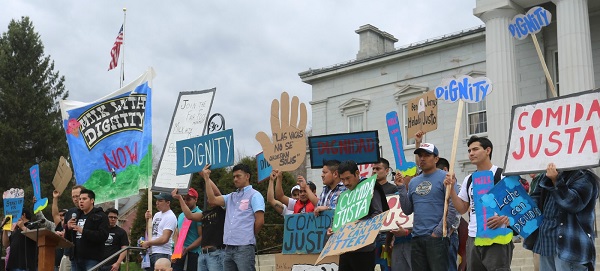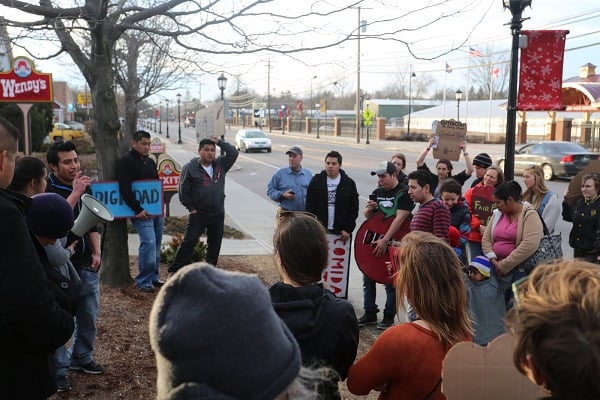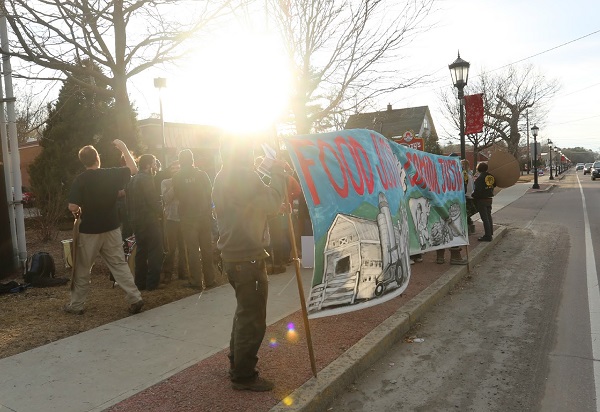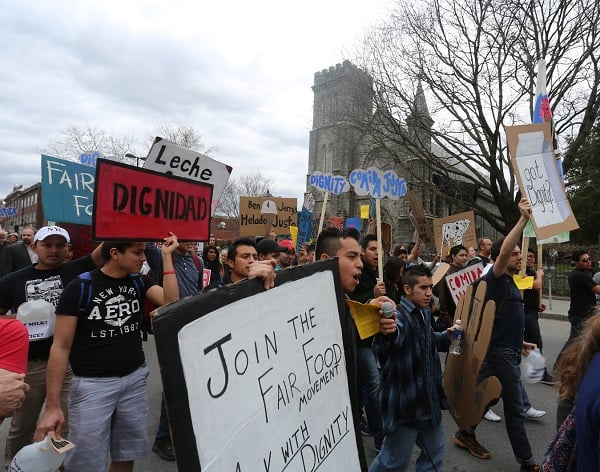
Inside the supply chain of Ben & Jerry’s ice cream, migrant farmworker Victor Diaz’s wages were being illegally withheld last summer. He was living in an overcrowded trailer in Ferrisburgh, Vermont, its leaky roof covered with a blue vinyl tarp, and a liquid cow manure storage pond leaking into the workers’ drinking water. Then Diaz and other farmworkers marched on the farm with people of faith and community allies, winning his back wages.
By winning his wages through collective action, Diaz, a migrant worker from southern Mexico, found his voice as an emergent leader in a movement of farmworkers called Migrant Justice. “[The wage theft victory] was a transformative moment for me. I had endured years of abuse,” said Diaz. “If you look back we had that type of transformation happening with all of our victories, whether it’s with drivers’ licenses, or our work to stop collaboration with immigration by police, and now the number of people getting involved – and also being transformed – just keeps growing and expanding.”
On June 20th Migrant Justice will stage actions at ice cream shops in 14 cities nationally, demanding Ben & Jerry’s pay a premium to ensure safe housing and livable wages for farmworkers like Victor in their supply chain.
Ben & Jerry’s might seem like an unlikely target: with its origin story of two tie-dyed hippies fighting for survival via guerrilla actions against a larger ice cream corporation, fair trade sourcing of ingredients, celebrated treatment of animals in their supply chain, and a social justice verbiage laden mission statement. Many years later, and now under the control of the Unilever corporation, the ice cream company generates nearly $600 million in annual domestic revenue and operates internationally in 25 countries. Yet Diaz is far from the only migrant farmworker experiencing wage theft, overcrowded, unsanitary housing, and poverty wages in Ben & Jerry’s supply chain.
“Historically,” CEO Jostein Solheim said, announcing Ben & Jerry’s backing of Occupy Wall Street, “this company has been and must continue to be a pioneer to continually challenge how business can be a force for good and address inequities inherent in global business.” On May 1st Migrant Justice marched on the Vermont statehouse, taking the steps to officially launch Milk with Dignity, a campaign which aims to get Solheim to fulfill those words.
 Migrant Justice members launch Milk with Dignity on the Vermont Statehouse steps. (Photo: Jonathan Leavitt)
Migrant Justice members launch Milk with Dignity on the Vermont Statehouse steps. (Photo: Jonathan Leavitt)
Collective Action to Overcome Nearly a Century of Legalized Discrimination
“Federal labor law” author Barry Estabrook writes in Tomatoland, “helped create and continue to support this abusive economy by specifically denying farmhands rights that virtually all other American workers take for granted.” Farmworkers’ racialized exclusion from the legal framework governing the labor movement, the National Labor Relations Act (NLRA), Estabrook describes as “legalized discrimination.”
“I see this as discrimination,” said Jose, a farmworker in Vermont. “Think about who [the NLRA] excludes, all the people who are doing farm work in this country, millions of us, generally Latino or Latina working in our industry. It’s the norm where you earn poverty wages, and you’re excluded from many rights and protections, whether that’s minimum wage or overtime.” A Migrant Justice survey found that 20% of Vermont’s 1,200-1,500 migrant farmworkers have their first paychecks illegally withheld, 40% are paid less than Vermont minimum wage, and 40% have no day off.
Migrant Justice’s coordinating committee analyzed different paths to establish rights for Vermont dairy workers. “The legislative path was going to be both slower and questionable in terms of what it would deliver to us in terms of rights and enforcement,” said Diaz. “Our analysis of power of the dairy industry and who has it helped us decide to go straight to the people who have the economic power, and that’s how we chose a corporate campaign and started specifically with Ben & Jerry’s.”
“When we’re successful with Milk with Dignity and secure rights through this campaign,” said Jose, “you start adding it all up and you have transportation through drivers’ licenses, which was a fundamental change in our life, you have the no-police-discrimination laws, and then dignified work.” Taken cumulatively, Jose maintains that these successes amount to, “significant change in our community, where we don’t feel the systemic discrimination on all those levels that we had been discriminated against previously.”

Overcoming a Geography of Isolation to Win New Allies and Claim New Rights
“This is the best workplace-monitoring program I’ve seen in the US,” Rutgers labor relations professor Janice Fine said of the Coalition of Immokalee Workers (CIW) to Stephen Greenhouse of the New York Times. “It can certainly be a model for agriculture across the US If anybody is going to lead the way and teach people how it’s done, it’s them.”
On April 2nd of this year Migrant Justice and the Coalition of Immokalee Workers marched on Wendy’s in Essex Junction, Vermont. The Vermont picket lines were part of CIW’s national effort to compel the fast food giant to pay a premium for tomatoes. It was one of many events and encuentros Migrant Justice has done with CIW in recent months. As farmworkers and allies marched inside Wendy’s, Gerardo Reyes said CIW members and allies had done “hundreds” of similar marches on similar chain restaurants to win the penny-per-pound premium from other bad actors in the fast food industry.
As a part of the coordination between Migrant Justice and CIW, Victor Diaz went to the Southern Florida tomato fields of Immokalee. “What I saw was how they built a huge movement, how they really expanded their base, how they developed a huge network of support and allies and this opened my eyes to the transformation that was possible,” Diaz explained. “I also recognized that they had over 12 agreements with major corporations. All of this gave me a vision and hope that right here in Vermont we could walk our own similar path and win Milk with Dignity.”
Neither CIW nor Migrant Justice has a strategic repertoire which includes National Labor Relations Board elections. Both rely instead on the constituent power of members’ collective action, and thereby recall the bolder pre-NLRA labor movement. As with many misclassified or excluded low-wage immigrant workers, from car washers to street vendors to domestic workers, farmworkers are building power in small, isolated workplaces. Migrant Justice members, organizing with few days off from work and in an isolated, rural setting, point to CIW’s numerous ways of member involvement: workers’ rights training, popular education and theater, inclusive “worker spaces,” such as an at-cost food co-operative, and allies, lots of allies.
All Migrant Justice’s decisions around strategic considerations, like the Milk with Dignity campaign, emerge from farmworker assemblies, Jose explains. “Four or five years ago inside the conversation in the community, we’d already started mapping out the idea of Leche Con Dignidad,” said Jose. “In order to have the capacity and ability to move around, there was something that we needed to do beforehand, which led to the focus on drivers’ licenses to have a community that was more mobile and less dependent, before focusing in on the workplace issues.”

“Migrant Justice’s Milk with Dignity campaign and the exciting collaboration with CIW, represents one of the most exciting new workers’ rights initiative in the country,” said James Haslam, Executive Director of the Vermont Workers’ Center. “By developing worker-driven mass campaigns to establish workers’ rights standards for an industry, they are charting a new course for efforts to raise standards for workers in these massive supply chains.” With the prominence of Fight for 15, Our Walmart, Justice for Janitors and CIW, corporate campaigns are increasingly being looked at as a new organizing strategy for a labor movement weathering a daily existential crisis of judicial and political attacks. “Just as Fight For $15 and other efforts have begun doing, workers need to create new ways to fight, build organization and worker leadership in these large corporate chains,” said Haslam.
“We have to take into account how much [Ben & Jerry’s] promote their image of social responsibility and fair trade and it’s part of their brand, it’s who they are,” said Diaz. “A national day of action like this has the potential to really demonstrate that we are united, that we’re big, that we’re growing, that we’re not going to stop. It offers them a challenge to their image, as our story comes out.”
Ben & Jerry’s media spokespeople have used the media to hold up Caring Dairy, an internet based farmer self-assessment system, as the logical rejoinder to the upsurge of supply chain worker unrest. Ben & Jerry’s hasn’t complied with a request for a list of participating Caring Dairy farms, and in an interesting casting call, the folksy promotional video for Caring Dairy doesn’t depict a single migrant farmworker.
Inside two meetings between Migrant Justice and Ben & Jerry’s, Diaz laid out the worker’ rights abuses, poverty wages and squalid housing he endured at two of their dairy suppliers, telling them they need to take responsibility. “I told [Ben & Jerry’s representatives] the key thing with Caring Dairy is there are no teeth, there’s no monitoring, there’s no enforcement, there’s no worker empowerment, there’s no worker education, there’s no worker participation,” said Diaz. “It doesn’t have what it takes to transform workers’ rights in your supply chain.” Under Milk with Dignity, farmworkers would have the power to enforce the agreement. “If there are violations we’ll have power to confront those violations. Fundamentally that’s the difference, workers are driving our program,” said Diaz.
The Ben & Jerry’s representatives reacted with surprise to the abuses farmworkers had endured, but painted Migrant Justice as questionable partners. “They even had the audacity to say, well you guys need to define yourselves and determine whether you want to be collaborators and work with everybody at a big table. Or if you want to be antagonists,” says Diaz. “It was surprising this was the tone they took.”
“We have actions planned across the country in over 14 cities – from Burlington, VT to San Francisco, to Naples, Florida – to demonstrate there is a big movement of support,” said farmworker Enrique Balcazar. “We will accept nothing less than an agreement between Ben & Jerry’s and farmworkers that brings dignity and rights to my community.”
“We are treating Milk with Dignity as one of the most important new fights in recent years to raise standards from for some of the most exploited workers in the region,” said Haslam. “We expect our members to join hundreds of community supporters and labor activists at Saturday’s march that starts at our joint office.”
Balcazar explained, “We called for the national day of action because we believe that as more people and consumers find out that Ben & Jerry’s has serious worker’s rights abuses in its supply chain they will stand with farmworkers helping to ultimately convince Ben & Jerry’s to join our program to ensure our rights are respected in their supply chain.”
On recent farm visits and farmworker assemblies, Diaz and Jose both described how Migrant Justice members around the state feel more confident than ever of victory. Diaz explained, “Our community is recognizing that we’re up against a huge business. This is a monster of a business. And there’s a recognition of that, but we’re not allowing any doubt to come in. We feel strongly that we can win, we can continue and they will do the right thing and recognize our rights.”
At the conclusion of the second meeting between Migrant Justice and Ben & Jerry’s, Diaz detailed to the food giant’s representatives how proud he was to be there representing his community, and left them with a question: “I want to ask you if you’re ready to sit down and negotiate an agreement with farmworkers: yes or no?”
Trump is silencing political dissent. We appeal for your support.
Progressive nonprofits are the latest target caught in Trump’s crosshairs. With the aim of eliminating political opposition, Trump and his sycophants are working to curb government funding, constrain private foundations, and even cut tax-exempt status from organizations he dislikes.
We’re concerned, because Truthout is not immune to such bad-faith attacks.
We can only resist Trump’s attacks by cultivating a strong base of support. The right-wing mediasphere is funded comfortably by billionaire owners and venture capitalist philanthropists. At Truthout, we have you.
Truthout has launched a fundraiser, and we have only 24 hours left to raise $17,000. Please take a meaningful action in the fight against authoritarianism: make a one-time or monthly donation to Truthout. If you have the means, please dig deep.
